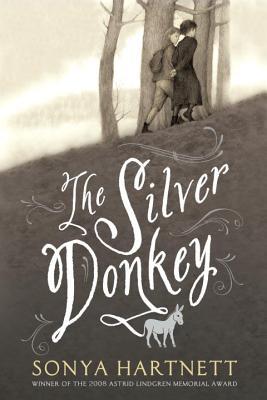 Angus, Sam. A Horse Called Hero
Angus, Sam. A Horse Called HeroJuly 1st 2014 by Feiwel & Friends
Wolfie and Dodo live in London under the care of housekeeper Spud while their father is off fighting in WWII. He was awarded medals during WWI, but is reported as missing at about the same time as bombings in London increase, so Spud sends Wolfie and Dodo out to the country. They end up in the care of Mrs. Sprig, whose son is off fighting and who is not thrilled to have two small children with her. Wolfie's father is fond of horses (he still has a cavalry unit), so Wolfie is thrilled when he finds an abandoned colt. When Wolfie's father turns up and is put on trial for desertion, Mrs. Sprig throws the children out. Luckily, school teacher Hettie Lamb and her minister take in the children and allow them to care for the horse, Hero. Children at school are mean, and Wolfie and Dodo are very worried about their father, who could be put to death if found guilty. Luckily, he is only sent to hard labor, and the children are allowed to stay with the lambs for a while. However, Hero is stolen, along with other horses, Rev. Lamb dies, and the children are sent to work. Wolfie ends up in the mines, where conditions are horrible. Things will get worse for the children before they get better, even after the end of the war.
Strengths: Soldier Dog was quite a good war book, and this had some good details about the battles that the father was in. Clearly, LOTS of research. More and more readers are interested in horses, and there are fewer books about children being sent out of London than there were in years past. I can't think of anything addressing the conditions in coal mines, so that's a nice touch. Fabulous cover.
Weaknesses: This was so, so sad. Just when you think things can't get worse, they do. This is more of a homefront book than a war book, so I'm not exactly sure that it will be something my readers of war stories will like. Debating.
 Hartnett, Sonya. The Silver Donkey.
Hartnett, Sonya. The Silver Donkey.11 February 2014, Candlewick (originally 2004)
Copy from Young Adult Books Central and reviewed there
Marcelle and Coco find a blind soldier in the forest near their home in France. He has run off from the fighting and is clearly shell shocked. The girls take him food and supplies, glad that they have a secret from their annoying older brother, Pascal. Lieutenant Shepard just wants to get back across the channel to his home in England to be with his younger brother, who is dying and asking for him. Marcelle tries to come up with a plan to get Shepard home, but cannot, even though she and Coco are good about bringing him food, and listening to the stories he tells that revolve around a small silver goodluck charm of a donkey. Eventually, Pascal is brought in on the secret, and he enlists a lame man from the town, Fabrice, to help get Shepard a boat across the channel. The girls are glad that Shepard will get home, but sad that they no longer can care for him.
Strengths: When I read this originally in 2007, I commented that adults would love it, and since this has been reprinted numerous times while so many titles go out of print, this must be true. This would be a good war book for younger readers, since there are some good details about the fighting in France, but not too many gruesome details. I like the formatting of the new edition-- the pages of stories have a border on them, and the font is a good sized and nicely spaced on the page. Did love the previous green cloth binding with just the silver donkey on the cover, though!
Weaknesses: I can understand why two of Shepard's stories are included-- one is about a donkey helping out on the battlefield, moving wounded soldiers, and one is about his brother. I don't understand why he tells the girls the story of Jesus' birth or Noah's Ark. I love this comment about Pascal and wonder why the author didn't take it to heart while writing the book: "Pascal tried to be polite, but he was quite disappointed with that story. He had hoped the soldier would tell them riveting adventures from the war, not stories about donkeys who had conversations with the sky." (page 127)































No comments:
Post a Comment